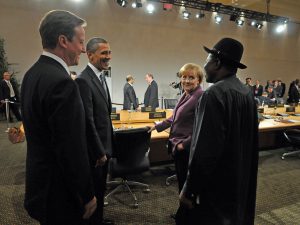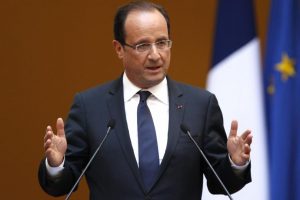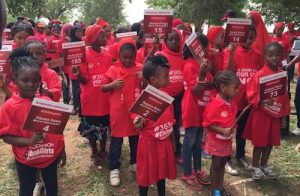
Dr Jonathan with world leaders of that time
Terrorism is very much about improvisation or reverse reasoning. As such, they are almost always able to beat state power to it, such as successfully carting away as large as over 200 girls from an unsuspecting rural Nigerian environment as Chibok in Southern Borno exactly three years ago today. Everyone assumed it was only a matter of time, that the might of the Nigerian State would prevail and the girls would be brought back. Or, if the Nigerian State lacked the technological infrastructure to accomplish such, then the great powers would move in and everything would be alright. Well, it is three years today and neither the Nigerian State nor the great powers have, individually or collectively, done anything like that. On the third anniversary, that ever present as well as the intriguing question as to how the search for the Chibok girls produced no rescue within the first one month is worth revisiting.

Front rankers of the Bring Back Our Girls, (BBOGs) campaign on the move
One good reason for doing so is the memorable warning by scholars such as Didier Bigo that “any academic definition which tries to stabilise the meaning of security is either naive or politically oriented”. It is best to allow him explain his pessimism: What is central in the game of the actors concerned with security claims are the struggle for legitimacy of the actors themselves around their ambiguous practices of coercion, surveillance, protection reassurances of the public, gathering of information, elaboration of profiles, establishment of patterns about dangerous actions or risky outcomes in order to label them security to produce obedience”. Thank goodness then that there are movements such as the Bring Back Our Girls, (BBOGs) to keep all the players on their toes although Bigo and his fellow travellers in International Political Sociology neither had the Nigerian State nor the Chibok girls calamity in mind.
The more familiar thesis to start with before going into more complex ones is that which said the then president and Commander-in-Chief of the Armed Forces, Dr Goodluck Jonathan did not believe that some citizens had been abducted. According to the thesis, he thought it was part of the tactics being used to embarrass his government. This is the claim by former President Obasanjo which could be said to find empirical demonstration in the president’s wife’s dramatisation of incredulity in the ‘There is God oo’ video to that effect.

Dr Goodluck Jonathan as Commander -in-Chief of the Nigerian Armed Forces
The second thesis would be that which speaks of the government of the day’s rejection of British offer in particular to intervene and rescue the girls. The British press has been consistent on this, much, much earlier and recently too. But even the Nigerian media did so too as in the case of The Nation’s lead story May 11th, 2014 titled “Abduction: Nigeria Rejected Help for Weeks, Says US, UK”. Before the rejection matured into a media story by that date, it must have happened at least two weeks earlier. The paper talked of offers of help from day One but the rejection of same on the ground that the Federal Government and the military high command at the time were uncomfortable with allowing foreigners run the rescue agenda. It indicated acceptance of such offers only in the third week after the Nigerian president had become convinced that the abduction was real. At this level, it is only possible to pose questions because answers would not even be as helpful. One such question would be whether the people who man the security of the state at the level of the president and the military hierarchy were acting out their induction in national security by resisting such offer of help or whether they just proving Didier Bigo right? British officials who have spoken on the issue have always said “it is up to the Nigerian government/Nigerian military to…”, thereby suggesting that there is a Nigerian sensibility to what could be called or interpreted as subversive generosity. Only those who operate at this level may understand how delicate this could be and ordinary citizens may never be drawn into them if there were no Chibok girls imbroglio.
A third thesis exists in the notion that it was lack of financial capacity that humbled Nigeria or it could have gone into it and prevailed by bringing out the girls. Intelligence as well as surveillance, it is claimed, were still showing the girls together for quite some time after the abduction, making it vulnerable to a storming and rescue operation within the first one month. Again, the truth of this is neither here nor there now. Suffice it to say that it is believed that lack of money for a quick acquisition of certain fighting capacity stalled the rescue within the time it could have been possible. If the girls were truly in Sambisa or wherever for some time, then it makes sense to speculate that Boko Haram commanders must have been anticipating a storming exercise in separating them afterwards.
The fourth thesis is the one that rescue became difficult because the insurgents eventually scattered the girls into batches, making a rescue agenda more complicated unless there was a way to identify and locate the different batches and plan the rescue attack to take place simultaneously. That could not have been beyond the security agencies except that it didn’t happen.

The US surveillance plane said to have spotted the girls earlier
Fifth thesis argues Nigeria being locked up in a power game as far as a rescue agenda was concerned. As the story goes, this is why all the promises of United States in terms of satellite and air surveillance through drones, special operations warriors and other components of military support its officials spoke about didn’t amount to a rescue. Sara Sewall, US Under-Secretary of State for Civilian Security had said in a testimony at the House of Representatives Foreign Affairs Committee that President Obama pledged US support and President Jonathan accepted Secretary Kerry’s offer of assistance”. That was May 21st, 2014 although the offer of assistance she referred to was “from day one”. Much, much earlier, Johnie Carson had been reported in a Daily Trust, (May 10th, 2014), lead story speaking about how military advisers would be involved. The Nation came up in its May 23rd, 2014 front page lead with “Chibok Girls: US Air Force Men, Drones Go Into Action”, escorting it with ‘UN Slams Sanctions on Boko Haram’ and ‘Cameroun, Chad Draw Battle Plan’. So, the US was quite categorical.
Other powers were equally mentioned. President Goodluck Jonathan specifically said “Already, USA, UK, China, France, Israel, Spain, Cameroun, Chad, Congo, Benin Republic and others as having joined the search. That was on May 10th, 2014. “Chibok Girls: Israeli Counter-Terrorism Experts Arrive Soon”, screamed the Blueprint on May 12th, 2014. Then there appeared what seemed a change of the dancing step. First came the story, “Rescue Will be Difficult – US Defence Chief “, (People’s Daily, May 11th, 2014). Chuk Hagel, the Defence Chief in question, was saying “there’s no intention, at this point, to put American troops on the ground”. It would be very difficult, he said, because “It is a vast country. This is not going to be an easy task. We are going to bear every asset we can possibly use to help the Nigerian government”. In what appeared a follow up on Hagel, Chuck Prichard, spokesman for US Africa Command declared on May 23rd, 2014 how US airmen numbering 80 were in Chad, using a drone to help find the abducted girls. All these were past the first one month and the girls might have been redistributed by this time.
Second, the US was reported to have been angered by a belief that intelligence information were not safe in certain hands within the Nigerian security establishment. Third and still in relation to the US, was the emergence of bitterness about corruption in Nigeria vis-a-vis the Boko Haram issue. Again, Sarah Sewall, US Under Secretary of State for Civilian Security, Democracy and Human Rights was quoted (The Punch, May 23rd, 2014) as saying that “corruption prevents supplies as basic as bullets and transport vehicles from reaching the front lines of struggle against Boko Haram”. In what appears a corroboration of that in the same newspaper, the same day, a military source said that “it is not just about non-release of appropriated funds. Even money approved by the president was not released”. The Buhari government which took over from the Jonathan regime has said that there was diversion of funds meant for arms procurement and has arraigned several military chiefs in court. This is not contradicted by Mrs Okonjo-Iweala, the immediate past Minister for Finance who said in Saturday Punch, (May 24th, 2014) that there was never budget enough to meet military demands but that the sector had taken almost a trillion of the budget” at that point. Again, Didier Bigo speaks to the issue. The fourth segment of the fifth thesis is the ban on sale of certain category of weapons on the ground that the Nigerian military had a record of mass violation of human rights. Donald Trump, Obama’s successor is just in the process of lifting that ban, indicating how the earlier position was itself discursive.

French leader, Francois Hollande
Still on the power game thesis, a platform calling itself the Concerned Statesmen and Patriots In Nigeria, (COSPIN) recently and categorically carpeted France as a financier of Boko Haram. Although not one of the popular platforms in Nigeria, being led by a Professor of Philosophy makes it difficult to dismiss its voice. It said the silence of French authorities on the arrest of French nationals during the raid on ground zero in Sambisa Forest by the Nigerian Army was disturbing. Their spokesperson also told journalists in Abuja February 22nd, 2014 that France ought to explain the sighting of its aircraft across Nigeria’s borders with Cameroon, Chad and Niger Republics. The platform is piqued by delivery of weapons to the terrorists through countries bordering on Nigeria, all of which are Francophone. Beyond the mention of France, reference has also been made to the claim attributed to Henry Kissinger to the effect that a strange Cold War is in place in Africa, implying two new players locked in a test of strength across the world but even more so in Africa. There is a general belief that France is stronger on the ground in Africa because all French speaking African countries are accessible to France in a way that English speaking African countries are not for the British and the US.
Only time would tell which of these five theses or a combination of them best explains the failure of a rescue agenda, first, in the first 30 days of the abduction and, second, till today, three years after. Now, only negotiation and God seem to be the ways out. President Muhammadu Buhari said in a statement on the Third anniversary that negotiations between the government and Boko Haram had reached advanced stage. The British government is saying similar things. Many more players, local and global must be at work towards the same goal of getting out the girls eventually.
Others are also hoping that God, in His own way, would touch the hearts of Boko Haram commanders to deliver the girls. Protagonists argue that, with God, nothing is impossible. And, they cite the case of the commander who escorted the girl he took as his wife from among those abducted to safety in May 2016.

Chibok Girls Ambassadors
Whichever way it goes, cleansing Boko Haram insurgency is a task that is just beginning, going by the alarm by the United Nations Children’s Fund, (UNICEF) of a rise in the number of children used in ‘suicide’ attacks in the Lake Chad conflict. Marie-Pierre Poirier, UNICEF’s Regional Director for West and Central Africa said in a statement earlier in the week that unlike nine children used for the first quarter of 2016, the figure is already 27 in the first quarter of 2017, describing it as “the worst possible use of children in conflict,” the statement revealed that the report “Silent Shame: Bringing out the voices of children caught in the Lake Chad crisis” had shown that, so far, 117 children have been used to carry out bomb attacks in public places across Nigeria, Chad, Niger and Cameroon since 2014. These were four in 2014, 56 in 2015, 30 in 2016 and 27 in the first three months of 2017. The children used are mostly girls, bringing out a gender dimension of atrocities. UNICEF’s alarm reminds everyone of the challenge of denying the insurgency oxygen from wherever it gets it.




























